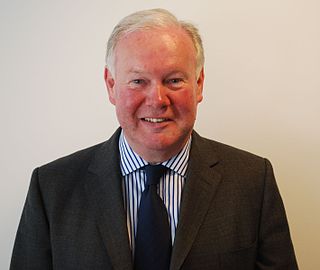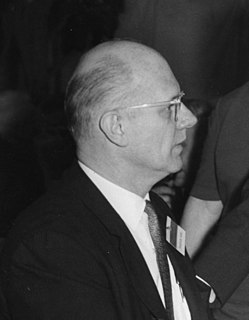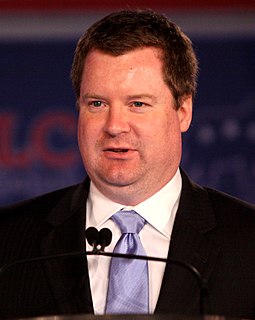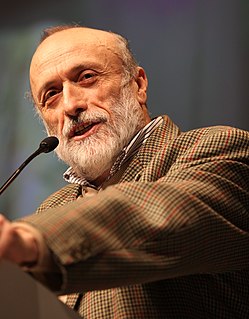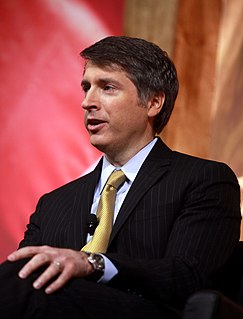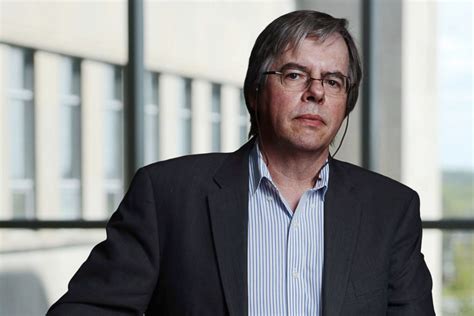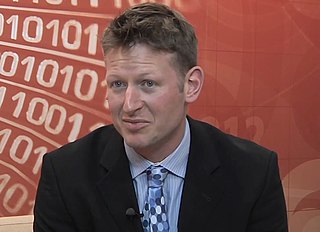Top 1101 Carbon Footprint Quotes & Sayings - Page 18
Explore popular Carbon Footprint quotes.
Last updated on April 21, 2025.
Global warming results not from the emission of greenhouse gases into the atmosphere, but from an unusually high level of solar radiation and a lengthy - almost throughout the last century - growth in its intensity. It is no secret that when they go up, temperatures in the world's oceans trigger the emission of large amounts of carbon dioxide into the atmosphere. So the common view that man's industrial activity is a deciding factor in global warming has emerged from a misinterpretation of cause and effect relations.
For all that we have done, as a civilization, as individuals, the universe is not stable, and nor is any single thing within it. Stars consume themselves, the universe itself rushes apart, and we ourselves are composed of matter in constant flux. Colonies of cells in temporary alliance, replicating and decaying and housed within, an incandescent cloud of electrical impulse and precariously stacked carbon code memory. This is reality, this is self knowledge, and the perception of it will, of course, make you dizzy.
If it were only a few degrees, that would be serious, but we could adapt to it. But the danger is the warming process might be unstable and run away. We could end up like Venus, covered in clouds and with the surface temperature of 400 degrees. It could be too late if we wait until the bad effects of warming become obvious. We need action now to reduce emission of carbon dioxide.
If Africa is left behind, she is going to continue pumping greenhouse gases into the atmosphere, especially carbon. She's going to continue logging the forests, she's going to continue burning charcoal, she is going to continue practicing agricultural activities that destroy the environment, and sooner or later Africa's problem will become a global problem.
Embracing a low carbon economy will be as momentous as the previous industrial revolutions. As the shift from coal to oil did. And the shift from gas light to electric light. It has the potential to give us the competitive edge in the new global economy. The scale of the challenge is extraordinary. We will need to reinvent in the way we live our lives, the way our world works
In the visible world, the Milky Way is a tiny fragment; within this fragment, the solar system is an infinitesimal speck, and of this speck our planet is a microscopic dot. On this dot, tiny lumps of impure carbon and water, of complicated structure, with somewhat unusual physical and chemical properties, crawl about for a few years, until they are dissolved again into the elements of which they are compounded.
This going on and on about how terrible a carbon-based economy is, these people are full of crap. They don't know what they're talking about. Their motives are not necessarily good just because they say they are being good. It's peace, love, and understanding. To which I can just say, "Shut up." Human liberty, rule of law, and free markets fix this stuff. It isn't necessary to go around being the Mia Farrow of the ecosphere.
This treaty [Kyoto] is, in our opinion, based upon flawed ideas. Research data on climate change do not show that human use of hydrocarbons is harmful. To the contrary, there is good evidence that increased atmospheric carbon dioxide is environmentally helpful...agreement would have very negative effects upon the technology of nations throughout the world, especially those that are currently attempting to lift from poverty and provide opportunities to the over 4 billion people in technologically underdeveloped countries.
[The doctrine of air] I was led into in consequence of inhabiting a house adjoining to a public brewery, where I at first amused myself with making experiments on the fixed air [carbon dioxide] which I found ready made in the process of fermentation . When I removed from that house I was under the necessity of making the fixed air for myself; and one experiment leading to another, as I have distinctly and faithfully noted in my various publications on the subject, I by degrees contrived a convenient apparatus for the purpose, but of the cheapest kind.
I think the mother of all arguments against eating meat now is the climate change argument. Methane is a much more powerful greenhouse gas than carbon dioxide and when we eat meat we wipe away many of the good things that we do when we try to create greener and more sustainable practices in the rest of our lives. So if you add the concern for climate change with other concerns that were there. I think the case for vegetarianism is pretty overwhelming.
The press heralded this as a major accomplishment. The rush from the press as soon as it was announced suggested a high level of coordination. Like lemmings in a staged dive off a cliff, 'historic' became the media's rallying cry. There is nothing historic about the deal. In fact, news reports from November 2012 noted that China expected, in 2012, that its carbon emissions would begin to decline after 2030 because of factory upgrades, efficiencies, etc.
I speak without exaggeration when I say that I have constructed 3,000 different theories in connection with the electric light, each one of them reasonable and apparently likely to be true. Yet only in two cases did my experiments prove the truth of my theory. My chief difficulty was in constructing the carbon filament... Every quarter of the globe was ransacked by my agents, and all sorts of the queerest materials used, until finally the shred of bamboo, now utilized by us, was settled upon.
First, we must stop wasting energy. A quarter of the UK's carbon emissions come from the home. Our housing stock - the oldest in Europe - is costing us the earth... After transport, heating is the second biggest driver of energy demand in Britain. British Gas research suggests that householders who put in energy efficiency measures cut their gas consumption by 44%. Better insulated buildings will do much of the work for us.
There's more and more recognition that a carbon economy is dangerous to us economically. And there is increasing recognition that renewable fuels have economic value as well as obvious value for our health and our well-being and our survival. In fact, as you know, the economic revolution in renewable fuels has been impressive. It really had not been anticipated.
Back in 2007, I met this white guy [director Peter Byck] with a lot of hair and a video camera, at a conference that I happened to be attending for the launch of an organization called Blacks in Green. I had never heard of him and Peter had never heard of me. We just started talking; he liked what I had to say, so he asked me if I'd be willing to be in this documentary he was doing about carbon pollution. I said, "Sure!" It was kind of a no-brainer.
Speaking for me, I think the odds of bankrupting Exxon are pretty small, but I think the odds of politically bankrupting them are higher. I think if we can use this as a vehicle to get out the analysis that these guys have 3-5 times as much carbon in the ground as the most conservative government thinks would be safe to burn, then that politically stigmatises them, makes them into the rogue industry that they are.
If food was no longer obliged to make intercontinental journeys, but stayed part of a system in which it can be consumed over short distances, we would save a lot of energy and carbon dioxide emissions. And just think of what we would save in ecological terms without long-distance transportation, refrigeration, and packaging--which ends up on the garbage dump anyway--and storage, which steals time, space, and vast portions of nature and beauty.
Essentially, my kids grew up with the emphasis on the environment because I became a political activist in about 1969 and it was not an easy time. Those were the days when the oil and gas companies pretty much controlled the show and anybody speaking about solar energy or carbon energy would get smashed down as being a radical or a tree-hugger or what have you. So I was out there feeling very often alone and my kids would get that.
These things are happening in large measure because of us. We in this country burn 25 percent of the world's fossil fuel, create 25 percent of the world's carbon dioxide. It is us - it is the affluent lifestyles that we lead that overwhelmingly contribute to this problem. And to call it a problem is to understate what it really is. Which is a crime. Crime against the poorest and most marginalized people on this planet. We've never figured out, though God knows we've tried, a more effective way to destroy their lives.
Many people I've met believe that plants are made up of soil-that the tree outside your house, for example, is mostly made from the soil in which it grew. That's a common mistake. That tree is mostly made up of one of the gases in our air (carbon dioxide) and water (hydrogen and oxygen). Trees are solidified air and sunlight.
The truth about the climate crisis is still inconvenient to the large carbon polluters. And so they want to bob and weave and dodge the truth, and pretend like it's still a big controversy, and it's not. They want to pretend that this is up for debate. Like, whether or not the world is round is up for debate, or whether the moon landing really took place.
If you're talking about mugging little old ladies, you don't say, 'What's our target for the rate of mugging little old ladies?' You say, 'Mugging little old ladies is bad, and we're going to try to eliminate it.' You recognize you might not be a hundred percent successful, but your goal is to eliminate the mugging of little old ladies. And I think we need to eventually come around to looking at carbon dioxide emissions the same way.
Stars die and reborn […] They get so hot that the nuclei of the atoms fuse together deep within them to make the oxygen we breathe, the carbon in our muscles, the calcium in our bones, the iron in our blood. All was cooked in the fiery hearts of long vanished stars. … The cosmos is also within us. We're made of star stuff. We are a way for the cosmos to know itself.
Customs, morals — is there a difference? Woman, do you realize what you are doing? Here, by the grace of God and an inside straight, we have a personality untouched by the psychotic taboos of our tribe — and you want to turn him into a carbon copy of every fourth-rate conformist in this frightened land! Why don't you go whole hog? Get him a brief case and make him carry it wherever he goes — make him feel shame if he doesn't have it.
The majority of America wants action on climate change. The majority of America thinks we should regulate carbon dioxide as a pollutant. And the majority of America thinks we should prioritize solar and wind infrastructure over fossil fuels. Those are impressive majorities, ones that every office seeker and office holder should heed.
The world's forests need to be seen for what they are - giant global utilities, providing essential public services to humanity on a vast scale. They store carbon, which is lost to the atmosphere when they burn, increasing global warming. The life they support cleans the atmosphere of pollutants and feeds it with moisture. They act as a natural thermostat, helping to regulate our climate and sustain the lives of 1.4 billion of the poorest people on this Earth.
I am quite surprised and rather disappointed by the loneliness, isolation and indeed demonisation the sadly misunderstood CO2 is experiencing. Thus, upon leaving the parliament, I am contemplating the foundation of an organisation called 'The Friends of Carbon Dioxide'. Membership will of course be open to all, including the plants whose very existence depends on CO2. I think this organisation's slogan, 'CO2 is not pollution', self-selects. It has both accuracy and melody to commend it.
When I'm talking about a developing world, I also look at clean-water access - women who are more vulnerable to sexual violence when they're fetching water. And talking about what we have going on here, with our carbon footprints and our emissions, is just as important to me as figuring out how to provide clean water to people who need it in regions around the world.
If we took 75% of the world’s trashed rangeland, we could restore it from agriculture back to functioning prairies — with their animal cohorts — in under fifteen years. We could further sequester all of the carbon that has been released since the beginning of the industrial age. So I find that a hopeful thing because, frankly, we just have to get out of the way. Nature will do the work for us. This planet wants to be grassland and forest. It does not want to be an agricultural mono-crop.
Bitumen is junk energy. A joule, or unit of energy, invested in extracting and processing bitumen returns only four to six joules in the form of crude oil. In contrast, conventional oil production in North America returns about 15 joules. Because almost all of the input energy in tar sands production comes from fossil fuels, the process generates significantly more carbon dioxide than conventional oil production.
The sooner we switch away from carbon-based fuel and start relying on renewable energy sources available in the United States, the sooner we will grow our economy by creating the millions of new jobs that will come from retrofitting homes and businesses, building smart grids, renewable energy systems and planting trees and all the rest. We need to create a lot of jobs that can't be outsourced.
We need to put a price on carbon, and that's what cap-and-trade does and that's also what a CO2 tax does. As long as our current valuation in the marketplace tells us every minute of every day that it's perfectly all right to dump 90 million tons of global warming into the thin atmosphere surrounding the planet every 24 hours as if that atmosphere is an open sewer, then the individual actions are not going to solve the problem.
Science probes; it does not prove. Imagine Newton's reaction to an objector of his law of gravity who argued that he could not establish a universal law because he had not observed every falling apple, much less proved the law of gravity - there might, after all, be an apple that levitates! Why should a group of simple, stable compounds of carbon, hydrogen, oxygen and nitrogen struggle for billions of years to organize themselves into a professor of chemistry?
Some molecules - ammonia, carbon dioxide, water - show up everywhere in the universe, whether life is present or not. But others pop up especially in the presence of life itself. Among the biomarkers in Earth's atmosphere are ozone-destroying chlorofluorocarbons from aerosol sprays, vapor from mineral solvents, escaped coolants from refrigerators and air conditioners, and smog from the burning of fossil fuels. No other way to read that list: sure signs of the absence of intelligence.
The horn of dilemma of energy politics is what really drives concern about this energy in this country, at the gut level for most people, is high gas prices. And if you really want to fight global warming and try to reduce our carbon emissions, the cleanest, easiest, most rational way to do it would to make the price of gas even higher through very stiff gas prices.
What are the top 20 universities in the world that do good materials research that might create carbon fibers to do jet stream kites or new magnets that will allow [energy] generation to be done up there and you just bring the electricity down. You either have to bring down rotational energy, which is hard, or you have to have the generator up there and bring down the electricity. Well, putting the generator up there is hard to do because it's too heavy.
There's no free lunch. If you want an industrial economy, you need energy. If you want energy, it will produce pollution. You can have it in two forms. You can have it dissipated in the atmosphere - like carbon dioxide - which then you cannot recover, or you can have the waste concentrated in one small space like nuclear. That is far easier to deal with. The idea that you can be able to create renewable energy at a price anywhere near the current price for oil or gas or coal is a fantasy.
An unfolding technology has increased our economic strength and added to the convenience of our lives. But that same technology-we know now-carries danger with it. From the great smoke stacks of industry and from the exhausts of motors and machines, 130 million tons of soot, carbon and grime settle over the people and shroud the Nation's cities each year. From towns, factories, and stockyards, wastes pollute our rivers and streams, endangering the waters we drink and use.
To change our national economic story from one of financial speculation to one of future growth, we need a third industrial revolution: a green revolution. It will transform our economy as surely as the shift from iron to steel, from steam to oil. It will lead us toward a low-carbon future, with cleaner energy and greener growth. With an economy that is built to last - on more sustainable, more stable foundations
The transition from coal, oil, and gas to wind, solar, and geothermal energy is well under way. In the old economy, energy was produced by burning something - oil, coal, or natural gas - leading to the carbon emissions that have come to define our economy. The new energy economy harnesses the energy in wind, the energy coming from the sun, and heat from within the earth itself.
I want to break up the Wall Street banks. Hillary Clinton doesn't. I want to raise the minimum wage to 15 bucks an hour. She wants $12 an hour. I voted against the War in Iraq. She voted for the War in Iraq. I believe we should ban fracking. She does not. I believe we should have tax on carbon and deal aggressively with climate change. That is not her position.
That’s the problem with all of this. No matter how hard I try, I can’t make it perfect. I can’t keep it in a bottle, can’t ignore reality. Chemicals are involved, the kind scientists try to synthesize and put into pill form, and they’re making tremendous advances every day. They’re winning the war against love. It’s probably inevitable now. There are only two ways to see the world: either no one and nothing is connected to anything, or we are all a random series of carbon molecules connected to each other. Tell me if there’s room for love in either of those scenarios.
Energy is a sector of the economy that has been particularly resistant to innovation. This is precisely the problem. It is why we are still dependant on energy sources that are 100 to 150 years old while virtually every other sector of the economy has transformed itself. This is why we believe that the faith that many environmentalists still hold that carbon regulations and taxes will drive sufficient private sector investment into energy markets to create the kind of innovation we need is unfounded.
We finally know where the red line for climate really is. After the rapid melt of arctic ice in the summer of 2007, our best scientists, led by NASA's Jim Hansen, went back to work and produced a series of papers showing that with more than 350 ppm (parts per million) of carbon dioxide in the atmosphere, we couldn't have a planet "similar to the one on which civilization developed and to which life on earth is adapted."
I'm working with wind, solar, and biofuels companies as well as with organizations like ACORE [American Council On Renewable Energy], Growth Energy, and AREDAY to raise public awareness and seek practical technological solutions to reduce our reliance on fossilized carbon. My book Don't Wait for the Next War will be out in October, where I will offer my prescription for America's growth, responsible development, and security.
My study is NOT as a climatologist, but from a completely different perspective in
which I am an expert … For decades, as a professional experimental test engineer, I have analyzed experimental data and watched others massage and present data. I became a cynic; My conclusion - 'if someone is aggressively selling a technical product who's merits are dependent on complex experimental data, he is likely lying'. That is true whether the product is an airplane or a Carbon Credit.
All the carbon copies, the stuff that the industry puts together, it's not selling if you pay attention and look at the charts. The stuff that they put together, these hits that just go out, it doesn't sell. It doesn't have a core fan base of fans that dedicatedly watch their life. It's just a song, another song, another hit song, a one-hit wonder. It doesn't sell. It doesn't last.
An outdated view still prevails that a low-carbon lifestyle requires immense personal suffering and sacrifice. In my view, nothing could be further from the truth. All the evidence shows that people who do not drive, do not fly on planes, do shop locally, do grow their own food, and do get to know other members of their community have a much higher quality of life than their compatriots who still persist in making the ultimate sacrifice of wasting their lives commuting to work in cars.
If I drive my car to the store, those carbon molecules that are emitted actually get into the atmosphere circulation systems and affect climate in a global basis. This is shocking, this is amazing! No one in the 18th Century would have believed that anything like this were at all possible and I don't think we have, as part of our common sense, morality, norms and values that are really responsive to those kinds of issues, to the kind of power that we now are able to exert over the future and over people who live very far from us.
Many of our actions degrade our habitat because we undertake them in order to reach goals whose allure blinds us to myriad dire consequences. In order to fuel our complex civilizations, we are lacing our planet's atmosphere with carbon dioxide, a greenhouse gas that, if it has not already begun doing so, will soon warm the Ice Age climate to which we owe our very existence.
That beautiful sister of mine was an overwhelming and volatile mixture. One had the feeling that she'd been shot from a canon and showered her sparks over an incredulous world with no thought or care where they fell, a carbon copy of father. She was like some silvery comet who streaked through life with daring speed, the wellspring of which was an inner confidence that I deeply admired. At times, particularly in childhood, I was intimidated by her but she dictated from an aura of affection for me that was never threatening.
We need a firm cap on carbon emissions from fossil fuels. No coal, oil, or gas could enter the economy until the buyer had a permit. All permits would be auctioned by the federal government, and the number of permits auctioned would be decreased by three percent per year. Permits could be traded, but they could not be created out of whole cloth by companies that plant forests or dump iron filings at sea.
Water: 35 Liters. Carbon: 20 Kg. Ammonia: 4 Liters. Lime: 1.5 Kg. Phosphorus: 800 g. Salt: 250 g. Saltpeter: 100g. Sulfur: 80g. Fluorine: 7.5 g. Iron: 5 g. Silicon: 3 g. And 15 other elements in small quantities. That's the total chemical makeup of the average adult body. For that matter, the elements found in a human being is all junk that you can buy in any market with a child's allowance. Humans are pretty cheaply made.
...if we all turned down the thermostat in our house by just one degree, we would save over £650 million worth of energy and nearly nine million tonnes of carbon emissions every year. That would be the equivalent of taking three million cars off our roads...we can bring about a Green Consumer Revolution in this country to improve our lives, enrich our economy and protect our environment.
I know we need more nuclear power in order - nuclear power, after all, is not dependent on fossil fuels and emits no greenhouse gases. I believe we're going to be able to have coal-fired plants that have zero emissions. We need to work on carbon sequestration technologies. I mean, there's a lot we can do together and achieve the objective, which a lot of people want, which is the reduction of greenhouse gases, and at the same time, have viable economic growth.
The question is: do we pay a little bit more now? Or do we pay a whole lot later? For the equivalent of a postage stamp a day for each American, we can put a price on carbon today that will send a signal to private capital to invest in the clean technologies of tomorrow. Taking a vast portfolio of new energy solutions to scale will ultimately drive down costs through competition.
All the big ideas for getting us onto a lower carbon trajectory involve a lot of people doing a lot of work, and that's been missing from the conversation. This is a great time to go to the next step and ask, well, who's going to do the work? Who's going to invest in the new technologies? What are ways to get communities wealth, improved health, and expanded job opportunities out of this improved transition?
In the Gaia theory air, water, and soil are major components of one central organism, planet Earth. What we typically think of as life - the plants and animals that inhabit the earth - has evolved merely to regulate the chemistry of the biosphere. Humans are insignificant participants, far less important to the life cycle than termites. Even the imbalance that we have created by adding massive quantities of carbon dioxide to the atmosphere may be brought back to acceptable levels by other organisms functioning in their capacity to correct excesses.
Four elements, Hydrogen, carbon, oxygen and nitrogen, also provide an example of the astonishing togetherness of our universe. They make up the "organic" molecules that constitute living organisms on a planet, and the nuclei of these same elements interact to generate the light of its star. Then the organisms on the planet come to depend wholly on that starlight, as they must if life is to persist. So it is that all life on the Earth runs on sunlight. [Referring to photosynthesis]
I've been working on a graphic about carbon emissions. It's an incredibly simple graphic - a bunch of blocks and a table below it - but it's taken me three weeks to design. For some reason it just wasn't working. Then finally I realized there was a number present, which I was rendering in each version, that wasn't necessary for the understanding of the piece. This figure was getting in the way and distracting from the main flow of the narrative. As soon as I pulled that graphic out of the design, it sprang into focus. Suddenly it worked.




